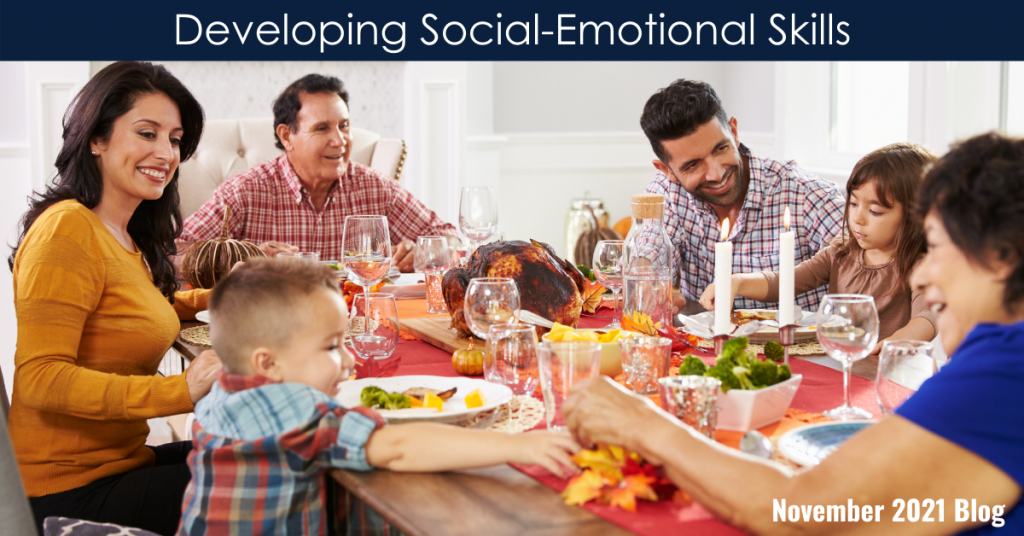Developing Social-Emotional Skills
In America, we are getting ready to have family togetherness at Thanksgiving. Cultures all around the world have special days where we see family, friends, and sometimes it has been a while since we have those we care about. For some of the smaller members of the family, they may be meeting people for the first time! Thanksgiving and other special days give families a great opportunity to give kids a chance to practice their social-emotional skills, which include self-awareness, self-control, and interpersonal skills. Being able to clearly communicate is important at any age and will be useful for the rest of their lives. Much of this know-how is developed in the early years of life.
Here are 4 tips for helping develop social-emotional learning experiences:
- When you go to the playground, play “I Spy” before you let them loose to have fun. This game will help them identify what is going on around them, and how to respond to it appropriately. For example, if there is a long line to go down the slide, helping them identify that fact, and talk them through waiting for the slides by going to play on the swings. This game will help them think through reading a room, making decisions, and waiting for something they want. It could also be a good way to discuss delayed gratification if all the equipment is in use.
- Making and using “emotion” flash cards can be a great way to help kids recognize and appropriately respond to the feelings of other people. Whether they use emoji faces or pictures of real people, they show pictures of a wide range of facial expressions from the simple to the complex. After a round of cards, they can ask questions about feelings that confuse them, and adults can talk about good and bad responses to them. For the creative family, you can even make the cards yourself by taking pictures of everyone in your family. Even the pets can get in on the action for silly faces!
- Playing storytelling games is a fun activity that is healthy for the kids and the adults in the room. It also helps them to think more dynamically and creatively. By creating other characters, they have to understand different kinds of people. They will empathize, as well as begin to examine right and wrong through their fictions. To build new worlds, they have to engage different parts of their brain, be inventive, and create a logic to it, even if it isn’t a logic that works in our world.
- Chores can be a good way to instill a sense of responsibility, pride, and accomplishment in children. They also can build on each other, so when they become teenagers and eventually young adults who live on their own, the habits of making their beds, washing dishes, and feeding a pet will be a part of their usual ritual and routine. The chores should be proportional to their ages.

by Bethany Verrett
Bethany is a freelance writer and editor. Click on her name to find out more!
Need more wintertime ideas? Check out our Winter Wonderland of Wellness blog post!
Learn more about joining the Stretch-n-Grow Family here, find a class for your child here, or email us at info@Stretch-n-Grow.com!
Click here to read our blog about engaging kids as they go back to school (it could be useful after the holidays)!

